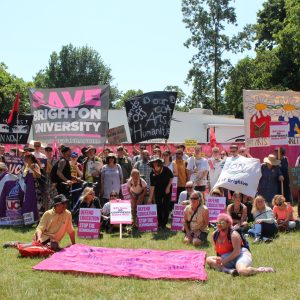Sept 2018
26th September Voting in Democracy Commission Elections. The coordinating committee has agreed to endorse the UCULeft recommendiations (see here) which aim to ensure that left candidates committed to greater union democracy are elected.
17th September OUT NOW Brighton UCU Newsletter. Read it here and be informed when you attend your branch meetings this week.
10th September. There will be branch meetings on all sites next week to discuss pay ballot, fixed-term contracts for permanent work, pay deductions for strike action and more. Please look out for details and do what you can to attend.
5th September. By now, you should have received your ballot paper for the UCU’s pay and equality campaign in the post. Please return it as soon as possible. If you have not received it, please let us know or you can request a duplicate ballot paper here.
3rd September Welcome back and Pay and Equality ballot. Many colleagues will be returning to work this work this week and we hope you have had a restful break.
You should have received the email below from the UCU General Secretary announcing the start of the ballot over pay and equality. You will also have received a message from our management to say that the University of Brighton is imposing UCEA’s 2% pay offer representing yet another real terms pay cut even though it has not been agreed with the unions. Far from beginning to correct the decline we have experienced in the value of our wages over the last nine years, it exacerbates it. You can read the union’s full claim here and click here for further information and the latest in the campaign.
Our dispute is about the overall value of our pay which has slumped as a proportion of universities’ income in recent years amid an upsurge of spending on new buildings. It is also about forcing our employers to address the gender pay gap and to reverse the growth of casualised contracts for lecturers.
A sector-wide fight over pay is also a fight to defend higher education from the corrosive effects of marketisation. The fee system and the removal of the cap on student numbers have widened the divisions between richer and poorer universities. This intensification of competition between universities is designed to force the collapse of national pay bargaining with the intention of driving down pay levels still further. If that happened, HE pay would be determined by local deals limited by the size of the bank balance of each institution. The pay of some in Russell Group universities would increase, while the poorer institutions – mostly pre-92s like Brighton – would claim that they could never afford a decent pay rise for their staff.
We will hear pleas of poverty from our own senior management over the next few months. We need to remember that the sector as a whole is richer that it has ever been. It is not our fault if these resources have become unevenly distributed as a result of the government’s policy of encouraging competition rather than cooperation.
Just like our colleagues in pre-92s who fought earlier this year to defend their pensions, we are also fighting to defend a unified higher education sector.
Vote Yes to action and post your ballot paper straight back.



Leave a Reply